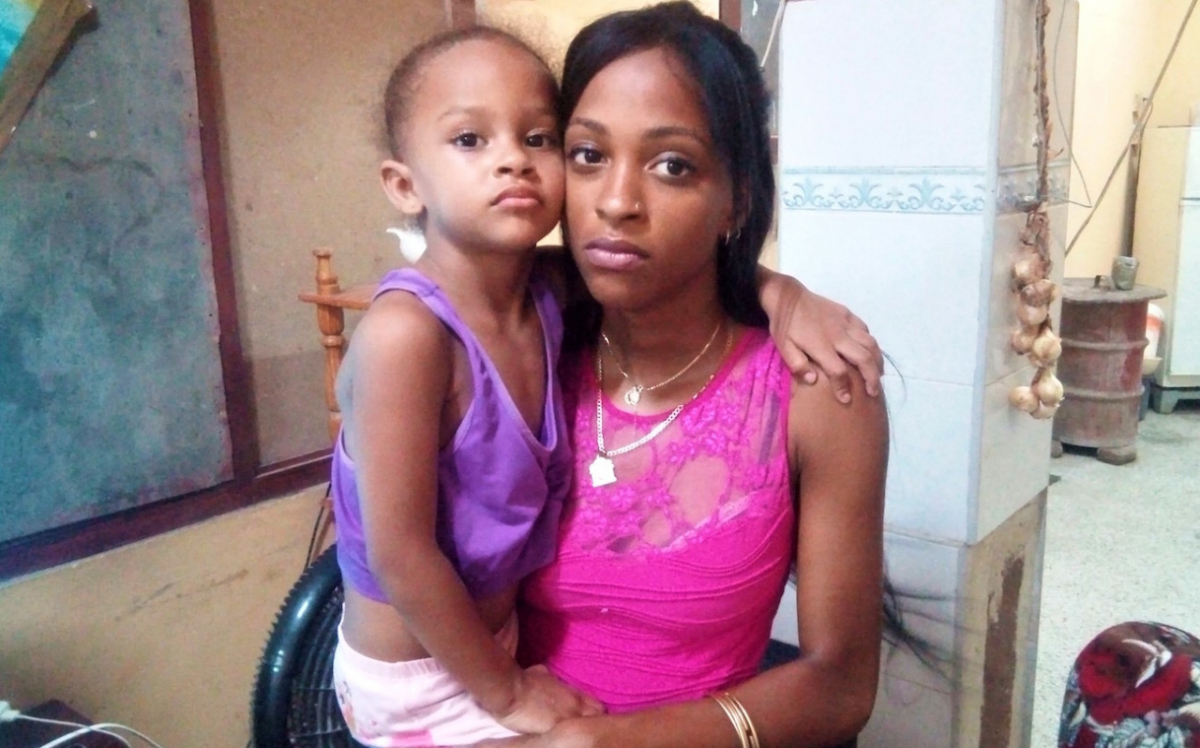On June 22, 2018, rapper Maikel Castillo Pérez "El Osorbo" was violently apprehended and taken to the prison known as El Vivac. His daughter, Jade Castillo Hernández, 2 ½ years old, was left alone in the Parque del Cristo (park), in Old Havana, where she was with her father.
Maikel had gone there to connect to the Wi-Fi network. Officers with the Anti-drug Department, engaged in an operation that day, thought that he was filming them, and rushed him to seize his cell phone.
The musician was on a hunger strike for 17 days at El Vivac. Rosmelis Hernández Hernández, his wife and Jade's mother, explained that he was later fined and released.
"Six months later he performed at the concert in La Burriguera, where he talked a lot about what was happening in the country. The next day they went looking for him. They took him to prison because the officer he had the problem with complained, evidently, saying how they could fine him, and that Maikel had to do prison time."
"On September 27, 2018, they took him away. The concert must have been on the 25th or the 26th. The trial was on March 20, 2019, almost six months later. The prosecutor asked for a year, but when the sentence was announced, it was 'one year and six months'. That really hurt him," says Rosmelis.
The 25-year-old is a manicurist and shares with Maikel a daughter, and their poverty. Their house, where we met for this interview, is the right, rear section of an old warehouse to which she arrived with her daughter about a year ago, after the nearby house she lived in with her mother and sister collapsed.
Her sister lives in a similar space not far away. The roof of the warehouse is worn away, the rods supporting it exposed. An enormous Peerless fence, set up to serve as a kind of makeshift ceiling, serves as a net to prevent larger pieces of debris from falling on them.
Maikel's house is a few blocks from the warehouse where his wife and daughter live. It is a much smaller space, part of an old mansion, where all the shoddy refurbishments done make it difficult to discern the original functions of the rooms, in which entire families now live. Curtains hang where there were once doors, panes installed between the ceiling and the floor multiply the number of spaces, and a set of stairs is almost perpendicular, to take up the least possible amount of space.
Maikel Castillo, whose stage name is "El Osorbo", was born in 1983, and was still a child when his mother left the country, leaving him in the care of a sister and a brother. His aunt raised him. "She is sick, she needs psychiatric treatment," explains Rosmelis. "Recently, she's much worse. She was admitted, because there was no shot (that she needs). Now she's a little better."
On Thursday, May 2, Rosmelis and Jade visited Maikel. The visit is at 2:00 PM, every 15 days. Rosmelis gets up early and, at 10:00 AM, gets a car in the Parque El Curita that goes directly to Valle Grande, the prison where Maikel is now.
Just the transportation for the visit costs her 100 pesos, 50 each way. Jade sits on her lap.
But the expenses do not end there. Rosmelis brings Maikel any non-perishable food that she can: soft drinks in plastic bottles (cans are not allowed), cookies, bread, cigarettes, sugar, milk.
The string of expenses compounds her poverty, and her emotional suffering. "Maikel is a fighter and a good father. I really miss him, because he is my right hand. We raise the girl together, and now I’m all alone here," says Rosmelis, who looks tired, but not weak.
At 1:20 PM they start calling the relatives and friends in the waiting room at the prison. "The visit lasts two hours. The place is like a cafeteria. Maikel's relationship with the guards is not good. He tells me that they provoke him. I tell him to let it go, because maybe they do that just to get him in more trouble."
Rosmelis tells him about the family. "His aunt asks about him a lot, and keeps up. She doesn't visit him, though, because we're afraid it might just worsen her health."
Maikel knows that he has a lot of support, and writes notes for his friends in which he expresses gratitude and firmness. He is one of those people who is admired for his lyrical capacity and sensitivity to the world and the hand he was dealt in it; a world that, with all the adversities he has had to face, seems designed to render him antisocial.
While I interview Rosmelis, Jade appears. Her desire to play with her cousin and other friends with whom she lives at the old warehouse is stronger than her curiosity. Even so, she walks about and gathers, though just 3 ½ a half years old, what is being said about her father.
Rosmelis says that when they took her home, on the day they arrested Maikel, the girl cried and said: "My dad was dragged off, by his hands and feet".
Jade is not listening, as her cousin has called her. Evening falls for Rosmelis and Maikel. You have to spend an afternoon in a prison to find out how many things fall along with it.
